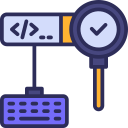Boosting Audit Productivity with Scripting Skills
In today’s rapidly evolving business environment, auditors are expected to deliver faster, more accurate insights while managing vast volumes of data. Traditional audit techniques, while foundational, often fall short in meeting the speed and efficiency demanded by modern clients and regulators. By harnessing scripting skills, auditors can automate routine processes, drive consistency, and uncover deeper insights. This web page explores how scripting enhances audit productivity, from automating tasks to improving data analysis and ensuring exceptional audit quality.

The Changing Landscape of Audit Work
Clients and regulators now expect audits to be not only thorough but also completed quickly, without sacrificing quality. This creates immense pressure on audit teams to deliver faster results using advanced techniques. Scripting allows auditors to meet these expectations head-on by automating repetitive tasks, thus freeing up time for higher-value activities. By adopting scripting, audit professionals modernize their workflow and position themselves as trusted advisors equipped for future challenges.
Organizations generate massive amounts of complex data daily, spanning multiple formats and systems. Auditors must be prepared to handle this data deluge efficiently and accurately to identify risks or anomalies. Scripting skills empower auditors to extract, clean, and analyze large datasets quickly, eliminating the laborious manual data manipulation that can slow audits down and potentially introduce errors.
Stakeholders increasingly rely on audits to provide actionable insights, not just identify compliance gaps or errors. Scripting allows auditors to perform more sophisticated analyses, such as trend detection, predictive modeling, and exception reporting. With enhanced scripting capabilities, auditors can deliver deeper, data-driven recommendations that add tangible value to their clients’ decision-making processes.

Leveraging Scripting to Automate Routine Tasks
Auditors often spend hours extracting data from multiple sources, including ERP systems, databases, and spreadsheets. Scripting enables audits to automate data extraction processes, ensuring that all relevant data is gathered quickly and in the proper format. By scripting these steps, auditors eliminate human error, boost efficiency, and can rerun their workflows easily as new data becomes available, further shortening audit cycles.

Scripting allows auditors to move beyond traditional sampling and basic reconciliations into advanced analytic territory such as pattern recognition, outlier detection, and correlation analysis. These techniques expose anomalies or trends that could indicate fraud, error, or control weaknesses. With scripting, auditors can analyze entire populations of data, increasing assurance levels and surfacing insights that add real value for stakeholders.

Modern auditing increasingly involves examining transactions and controls in near real-time rather than after the period ends. Through scripting, auditors can set up continuous monitoring routines that automatically flag unusual or suspicious activities as they occur. This capability elevates audits from reactive post-mortems to proactive risk management tools, providing stakeholders with timely warnings and greater peace of mind.

Every client has unique reporting needs, and meeting these with manual methods often results in inefficiency or inconsistencies. Scripting enables auditors to design flexible reporting templates that update automatically as new data is processed. Auditors can quickly tailor reports to specific client requirements, ensuring that deliverables always remain accurate, professional, and relevant.
